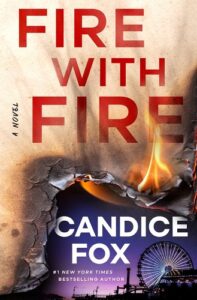It’s never been more important to start your crime novel with high-stakes. Doesn’t matter if it’s life-or-death type peril, or if someone’s marriage is about to go down the toilet. Maybe he’s hanging from his fingernails from a cliff. Maybe she just arrived home from meeting up with her boyfriend, and hubby’s sitting there in the dark kitchen waiting for her, his eyes full of dreadful knowing. Something has to be at badly at stake in your opening page, paragraph, line, because we’re living in a time when readers don’t have to tolerate anything less.
Elmore Leonard said it in his ‘Rules for Writers’: ‘Never open a book with weather.’ He was trying to say that what’s going to hook a reader will invariably be a person and their problem. Readers are not going to sit waiting for you, the writer, to stop faffing around with your aerial shots of the city and its romantic rain haze and get to the actual story. These days, they’re going to move on even faster than they did in 2010 when Elmore said it, because the digitization of the slush pile and the dominance of online bookstores means their patience is at an all-time low.
It used to be that a publisher or an agent snuffling happily around in the slush pile like a blood hound on a scent used to have to physically open a book. They had to slice into a box from the post office, take out a package, lump that package loudly onto the table and unwrap it, and then slide out a thick manuscript of lovingly typed pages bound in elastic or ribbon or string. They had to peel back the first page to get to the story (by way of the cover letter and synopsis). With all this necessary physical ceremony, it’s logical to assume some subconscious instinct would see said publisher or agent give your story a page, at least, to impress, right? A couple of lines? Before the whole operation is aborted for the next package in the box.
So too, before digital bookstores became a thing, shopping for a book meant standing in an aisle in a bookstore. It meant lifting one’s arm and in full public view, selecting a book from the shelf, holding it in your hands and feeling the weight of it. The effort. The potential. If the desperately hopeful book has been successful in luring the reader into the aisle, and it has then made it off the shelf into the reader’s hands; how many pages does this book have to impress? How short an interaction is worth all the ceremony of taking the book down in the first place?
Now, for both the literary gatekeepers and the reading public, the try-before-you-buy experience is lightning fast and requires no physical or monetary investment. Publishers and agents can open an email-submitted manuscript without any ceremony or effort at all, and so too can they abandon that book with a click. Readers have the luxury of perusing first pages of books on both Amazon and GoogleBooks without paying a cent, and when they click away, they have instant access to millions upon millions of other titles. Both styles of rejection of published or unpublished books are mobile, private, effortless and free.
So what does that mean for writers? It means you have less time than ever to get your reader into a situation in which they just have to know what happens next. You’ve got literally seconds. You’re hauling ass up the highway, screeching to a halt, throwing the door open beside a reader and yelling ‘Get in!’ You’re trying to convince these people not to turn away, because your ride is the best ride, the last ride, the only ride. In reality, the highway is at a standstill. It’s bumper to bumper, rammed. But you have to make them forget that. You have to take them against their will. All the language surrounding crime novels, in particular, reflects that. Readers want to be ‘hooked’, ‘gripped’, ‘grabbed’, ‘ensnared’. ‘Gets you from the first page and never lets go!’. Readers don’t want to look at the rain haze. They want to be abducted.
There’s no hard and fast rule about how to present a reader with a character they’ll care about who’s deep in a high-stakes situation in only a couple of lines. But knowing that you must start hard is half the battle. Lee Child did it, when he won the world over with ‘I was arrested in Eno’s diner.’ All we’ve got in these six words is the knowledge that we’re about to be hauled away and locked up, and we’re going to experience it in the first person perspective. For most of the law-abiding world, we’re presented with an unfamiliar and perhaps thrilling experience. Leonard held true to his advice when he opened Freaky Deaky with “Chris Mankowski’s last day on the job, two in the afternoon, two hours to go, he got a call to dispose of a bomb.” The perilous appeal of the bomb part is obvious. But who hasn’t been a work-place clock-watcher in their time? All the feels, Mankowski. In my latest, I hope I’ve had readers racing for the checkout with ‘Something in the water grabbed her calf. Her brain screamed the word. Shark.’
Writers, don’t open a book with the weather. Open it with an abduction of the reader. It’s what they want.
***


















